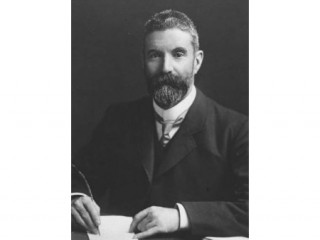
Alfred Deakin biography
Date of birth : 1856-08-03
Date of death : 1919-10-07
Birthplace : Melbourne, Australia
Nationality : Australian
Category : Politics
Last modified : 2010-11-21
Credited as : Politician, former Prime Minister of Australia, newspaper writer "Age"
Alfred Deakin was an Australian political leader who established a remarkable record in colonial and federal politics in constructive and progressive causes.
Alfred Deakin was born in the gold-boom city of Melbourne on Aug. 3, 1856. He studied law at the University of Melbourne, became a writer for the progressive newspaper Age, and in 1879 was elected to the legislative assembly of Victoria.
Deakin served in a succession of ministries. An ardent advocate of irrigation (then untried in Australia), he visited California in 1884-1885 and induced George and Benjamin Chaffey to develop an irrigation settlement on arid land along the Murray River in Australia. In 1886 he secured passage of the Irrigation Act to seal the arrangement.
When the proposals for federation of the Australian territories at the Federal Convention of 1891 lapsed in the colonial legislatures, he supported public calls for a popularly elected convention, and his powerful oratory warmed thousands to the federal cause; and in 1900 he was a member of the group which visited London to support the Constitution Bill.
A tall, slight man with a black beard and a plentiful crop of hair, Deakin was usually likened more to an academic than to an active politician. Some considered that he suffered from "mental remoteness," but others saw in him "an attractively refined and intellectual man."
Attorney general in the first federal ministry (1901-1903), Deakin succeeded Edmund Barton as prime minister. Refusing to accede to Labour party demands, he soon resigned, but in 1905, after Labour had made electoral gains, he formed a new Liberal ministry and stayed in office with Labour support until 1908. During this period, curbs on alien immigration were eased somewhat, pensions provided for the aged, and important commercial laws adopted. After a commission (set up in 1906) proposed that only factories paying "fair and reasonable" wages should be given the benefit of tariff protection, Deakin affirmed his New Protection doctrine of a benefit to the worker from tariffs; in 1907 a minimum, or "basic," wage was established.
Deakin lost support in 1908 but became prime minister for a third term (1909-1910) in a "fusion" with erst-while opponents on the non-Labour side. A significant defense measure was the creation of an Australian naval squadron. When Labour (under Andrew Fisher) replaced Deakin, many liberal measures advocated earlier by him were adopted. Deakin remained in the House of Representatives until 1913. He died in Melbourne, in retirement, on Oct. 7, 1919.
Deakin's comments on the events leading to federation are contained in his The Federal Story: The Inner History of the Federal Cause, 1880-1900 (1944; 2d ed. 1963). A biography by an admirer of Deakin's policies is Walter Murdoch, Alfred Deakin: A Sketch (1923). A fuller biography is J. A. La Nauze, Alfred Deakin (2 vols., 1965). Background on federation is provided in John Quick and Robert Garran, The Annotated Constitution of the Australian Commonwealth (1901); Bernhard Ringrose Wise, The Making of the Australian Common-wealth: 1889-1900 (1913); and John Quick, Sir John Quick's Notebook, edited by L. E. Freedman (1965). The record of the Deakin administrations is covered in H. G. Turner, The First Decade of the Australian Common-wealth … 1901-1910 (1911), and Arthur Norman Smith, Thirty Years: The Commonwealth of Australia, 1901-1931 (1933).
Gabay, Al, The mystic life of Alfred Deakin, Cambridge England;New York: Cambridge University Press, 1992.
















